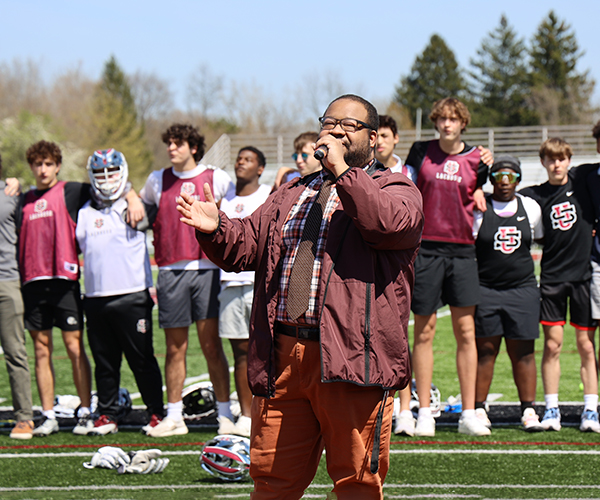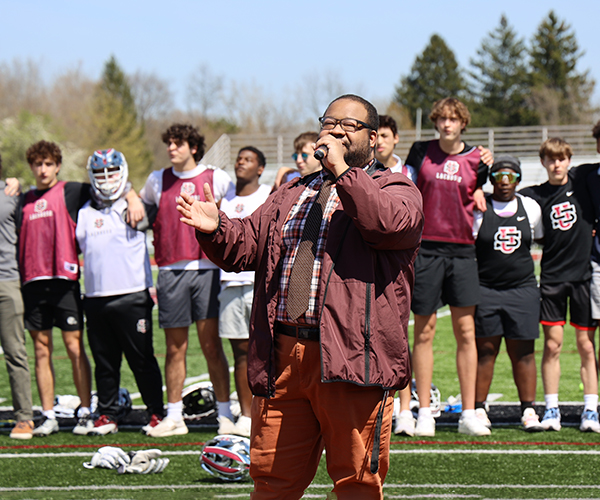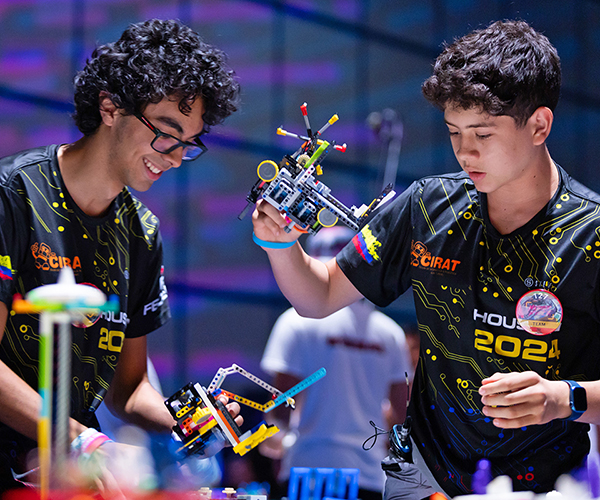Kevin Bonko glides back and forth in front of the net, thrusting out his body to deflect the puck. On a shot from the wing, he moves quickly to catch it in one gloved hand, then pushes it away with his stick. As an opponent drives it at him yet again, Kevin lunges knee-first onto the ice to block the shot.
Over and over, on this January night at the Brooklyn Recreation Center Ice Rink, the Brunswick Blue Devils fire the black rubber disc at No. 33 for the Vikings Hockey Club, part of the North Coast High School Hockey League. And over and again, he thwarts their attempts.
Then early in the second period a shot flies past his shoulder and lands in the upper corner of the net, tying the score at 2. Kevin takes off his helmet, looks down at the ice, and shakes his head.
But the St. Ignatius High School senior, who's been playing hockey since he was 8 years old, has learned how to shake off an opponent's goal — and the roadblocks in life.
By watching him on the ice, you'd never know Kevin is fighting leukemia, undergoing chemotherapy treatments each month.
The leukemia, diagnosed his sophomore year, hasn't kept him down. During more than three weeks in the hospital and intensive chemo treatments, Kevin maintained a grade-point average above 3.8 and missed only one hockey tournament his sophomore year and a single game his junior year. When the doctors told him he'd have to give up playing in the marching band, he drove straight from a chemotherapy treatment to band camp in Pennsylvania.
It's this resilience that experts say will have Kevin on the right path to success in college and in life. Yet, too often, teens are missing such soft skills that don't come from a textbook.
"We want adolescents to be emotionally agile and socially supple," says Elise Ellick, a teen counselor in adolescent medicine at MetroHealth Medical Center. "[They] need to have some kind of elasticity in terms of circumstances that they can't anticipate."
Some adolescent experts, however, are afraid students aren't developing enough soft skills to be successful once they leave home.
In our country, many more students start college than will finish. In fact, the U.S. ranks 14th among 28 countries for college graduation, with only 38 percent of students graduating, according to the Organization for Economic Co-operation & Development.
Exactly what has happened to this generation is up for debate. Though some blame overprotective parenting for shielding kids from failure, risk and struggle, the causes seem deeper.
"It's not a socioeconomic issue," says Lee Friedman, chief executive officer of College Now Greater Cleveland. The same result could occur in a family where parents micromanage their kids time or in a home where parents aren't around a lot and are unable to model good work or interpersonal habits.
Other adolescent experts attribute the lack of soft skills in today's teens to the fiercely competitive academic environment for college admission that emphasizes regurgitating facts for standardized testing rather than allowing for innovation and teamwork.
Still others suggest that our digital world, from Facebook to video games, has diminished teens' ability to interact well with others or analyze issues.
"Until about 15 years ago when email came along, there really were only a couple ways to communicate. You could talk or you could write a letter," explains Ethan Schafer, a child psychologist and consulting psychologist at University School and Lawrence School. "To talk you had to wait until someone got off your landline. You couldn't send an angry text in the car because you were pissed off.
We have instantaneous communication now, so the self-control that was built into our lives by limited technology is no longer there."
One day, Brian Martin, a teacher and chair of the St. Ignatius counseling department, asked how many boys in his freshman honors reading class asked their dates to homecoming through text or email. More than half the boys in his class of 24 said they had, he recalls.
"I was shocked," Martin says. "When we were growing up, you had to work up the nerve to call a girl on her home phone and pray that the father didn't answer, and develop some of those communication skills."
Self-control, resilience and communication are just some of the soft skills that teens may be lacking as they head off to college.
"We frame them as college readiness, but it's really more life readiness," says Martin. "If students don't develop these skills now, college will be more difficult, but far more important are the long-term effects it might have. Conflict resolution skills, problem-solving skills, collaboration, perseverance: Where is your career going to take you?"
Matt Janack, a freshman at the University of Akron, felt prepared for his first year away from home, but he still had some trepidation.
"At first it was really scary," says Matt, a Brecksville native who graduated from Lawrence School. "I didn't know where I was going. I didn't know my roommate at all, so I was out of my element. But then eventually, as I got more into it, I started to see how exciting it could be."
He incorporated some strategies early on in his first semester to help make the transition smoother. For the first few weeks of each semester, he carried a sheet of paper outlining exactly where his classes were and at what time. In addition, he has treated his school day like a 9-to-5 job, hitting the library to study when he has gaps between classes.
"One of the biggest tools that is helpful to me is office hours," says Matt, who has had classes with up to 160 other students.
Meeting a teacher during office hours, building a relationship and advocating for himself are skills emphasized at Lawrence. Along with that, Matt says, his parents allowed him independence as he got older.
Those are skills serving him well now in college. His roommate has become a close friend and he finished his first semester with a 3.6 grade-point average.
Tuli Namulemo sits on the beige sculpted carpet rolling cars up a ramp. At the top, a toddler in a pink and white striped dress giggles every time the plastic car rolls backward toward Tuli.
The scene repeats over and over with the toddler giggling more forcibly each time, until finally Tuli pushes it hard enough to reach the girl at the top. Immediately, the little girl scoops up the car, turns it around and lets it fly back.
Just as the car reaches her, another little girl comes from behind and pulls a clip from Tuli's hair. Long strands of tightly woven braids fall out, and she lets go quickly, leaving the clip dangling. The girl scrunches her face in concern, wondering if she may have done something wrong until Tuli turns, smiles, removes the clip and hands it to her, getting a big smile in return.
Every Friday afternoon, the Hathaway Brown senior works the school's infant and toddler room. It's something she enjoys, but it also gives her a better understanding of early child development, something she hopes will pay off when she becomes a pediatrician.
Tuli's family moved to the United States from Uganda when she was 10. She attended public schools in Cleveland Heights, North Olmsted and then completed an online school for her freshman and sophomore years of high school before transferring to Hathaway Brown, where she has thrived.
She's loved working in the nursery, spending time with the children, and has revived Crossroads, an after-school Christian club. The girls in the club get together twice a month for meetings, book and Bible study, and perform one or two service projects each year.
"I work with a club adviser and another student," Tuli says. "So you learn to collaborate, come to a consensus and talk about things."
Volunteering or working at a paying job are two of the best ways to gain skills needed for success, emphasizes College Now's Friedman.
"Even if you're a babysitter, you have to be on time. You're a supervisor," Friedman says. "Anything that takes you into where you've got your own responsibilities, and you've got a time schedule."
During high school, Matt volunteered at Ronald McDonald House. Kevin serves with the pallbearer ministry at St. Ignatius. Along with her leadership at Crossroads, Tuli volunteers in the nursery at her church.
"What better way is there to learn time management or conflict resolution or problem solving than by being on a team or in the band or in Science Olympiad?" says St. Ignatius' Martin. "Colleges want to see future leaders. The realm of extracurriculars is the greatest place to practice some of these skills. ... The classroom is a very controlled environment. A team or a practice may not be so controlled. You're going to get different situations there than you might get in the classroom, so the involvement in extracurriculars is huge."
However, more schools are trying to integrate many of these soft skills into their culture and curriculum. Among educators, they're referred to as 21st century skills and include what's known as the 4Cs: critical thinking and problem solving, communication, collaboration, and creativity and innovation.
At Hathaway Brown, those elements have become part of the culture by encouraging faculty to be mentors, and incorporating mastery of psychological well-being and social and emotional intelligence as a primary goal, says head of school Bill Christ. After all, the school's motto is "We learn not for school, but for life."
Two years ago, Oberlin Public Schools started a drastic curriculum change to the International Baccalaureate program, which works to teach lifelong learning and intercultural understanding.
Oberlin incorporates the International Baccalaureate curriculum in K-12, although high school students have the option of taking IB classes or going all the way for an IB diploma.
"Normally, kids come to school and say, 'Tell me what I need [to do] to get an A,' " says Ann Glass, director of communications for Oberlin City Schools. "In IB, it's 'Tell me what the criteria looks like and how can I do better?' The A is not it. It's about, 'How can I improve myself?' "
Glass says that a bulletin board in one of the Oberlin elementary schools says it all. It's filled with photos of kids in action, collaborating and doing community service, also an integral part of IB.
"It's a cultural shift over time," Glass says. "You're talking about growing people to have respect for themselves and to want to inquire to be better and improve themselves, and, in turn, give back to the community that they live in."
Parents also play a critical role in their children's success, even though adolescence can be as tough on the parent as it is on the child, says Ellick, MetroHealth's teen counselor.
Tammy Gentry, the marketing coordinator at Valley Christian Academy in Aurora, and the mother of three, recognized the importance of teaching children good communication skills. She invented Pennystones, a game named for the old adage, "A penny for your thoughts" to start conversations with her children around the dinner table.
One day when her uncle visited, her son who had never met the man before started a conversation by asking, "Who was your favorite teacher?" The uncle later commented that he wasn't sure if his own kids — in their 20s — could break the ice so easily.
"Parents are always going to have that instinct to protect, but adolescents need to move out into the world to a certain extent, and parents have to recognize that adolescence has a wider perimeter," Ellick says. "Parents need to be very clear with their adolescents about boundaries, expectations, and about having ongoing communication."
Having a strong parental core, or other adult mentors to turn to, is one of the keys to giving resiliency to teens, Ellick says.
Throughout Tuli's experiences, each change has required new adjustments socially and academically, but Tuli says she has grown even through the toughest. She was laughed at in fifth grade after attending school in the standard unisex clothing of her native Uganda. And she's learning new study strategies to pass a tough physics curriculum at Hathaway Brown, even though she hadn't had chemistry from the online school that would have helped. (She color codes notes, reads chapters in advance of lessons and schedules regular meetings with the teacher.)
"It gives me more resilience," Tuli says. "I know when I fail I will learn from it. On the other hand, kids who have not experienced such a failure I don't know if they would be open to try new things."
Since being diagnosed with leukemia, Kevin has had to discover a toughness that he never knew he had before. "It had been my goal since fourth grade to attend the Naval Academy and to be an officer in the Marine Corps," Kevin says. "Since then I've been disqualified because of the cancer."
He has plans to pursue a degree in nuclear or mechanical engineering and explore other opportunities to work with the Marines or the Navy through possible contract positions.
"Place your trust in God and it will turn out OK, even for the better," Kevin says.
And, it did turn out well for Kevin's team. The Vikings beat the Blue Devils with a goal in the last nine seconds of the game, 4-3.
Line Dance
The boundary between parental involvement and being overbearing may not always be clear.
Even if you haven't heard Aubrey Ireland's name before, you may have heard her story. She's the University of Cincinnati senior who took her overly involved parents to court to stop them from "stalking" her.
The judge ruled that the parents can't come within 500 feet of her until next September.
The parents harassed not only Aubrey, but also her school by frequently calling officials about their daughter. School officials, thrilled to get rid of the overly zealous parents, stepped in to pay Aubrey's tuition and get the parents off their backs too.
But how do schools walk the line between keeping parents involved and allowing them to stifle a child's independence?
"It's a blessing and a curse, this phenomenon of parent involvement," says Brian Martin, a teacher and chair of the counseling department at St. Ignatius High School. "There are studies that show the more parents are involved, the better kids tend to do academically and socially. I'd much rather have an involved parent than an absentee parent."
In many ways schools send mixed messages for parents to get overly involved.
"The availability of online grade books, starting from preschool, you know exactly how your kids are doing," he says. "You can monitor it every single day of their school life for 12 years."
So the key is to strike an equilibrium between home and school.
"The school and the family have the child at the center of their hopes and
aspirations and their thoughts and concern," says Bill Christ, head of school at Hathaway Brown. "We have this great commonality, which is the future of this young person. You really have to be proactive and communicate."
HB has created the Center for Family Support to help families, especially of young children, understand child development throughout the school years.
"The key is everyone knowing one another, not just having an email relationship," says Ethan Schafer, a consulting child psychologist at University School and Lawrence School.
Some kids, like those with attention deficit hyperactivity disorder or learning disabilities, may need more parental aid to work with teachers and get the best support. The line seems to be drawn when parents become the sole voice of a student.
That type of excessive parental involvement can stifle self-advocacy. If a student has an issue with a grade or a teacher, it's important, Martin says, for the child to learn to communicate with that adult, rather than send mom or dad in for the rescue.
"Students need to learn to advocate for themselves because when they do get to college, or particularly when they get out into the work world, they're not going to have the safety net forever," Martin says.
That support is most critical at the youngest ages. Tammy Gentry, marketing coordinator for Valley Christian Academy in Aurora, says that the K-8 private school encourages parents to get involved by volunteering in any way they can, from stuffing envelopes to supervising the lunch room to coaching. A former cheerleader, Gentry started helping the school's cheerleading squad when her daughter joined.
"Some people are very involved," she says. "But others are just busy. There's only so many hours in a day."
For parents who work and can't be as involved as they like during the school day, Gentry started a Family Speaker Series that is open to the community this year. Topics have included helping children get organized and how to raise healthy children.
But by high school, parents need to step back and look at if they are constructively involved, which is a benefit to children, or destructively involved which can infantilize kids, stunting maturity, Martin says.
"As a parent, you want to be well informed, but you also want your child to grow up to be an independent and thoughtful decision-maker, and there are certain things that are the parent's job and lots of other things that are the student's job," Christ says.



